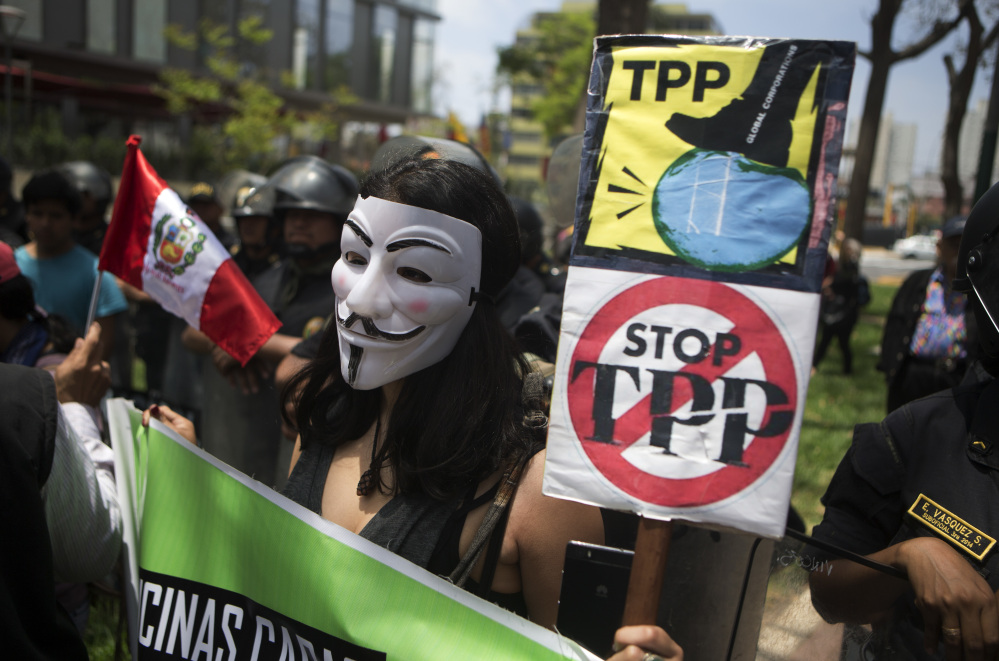SOUTH PORTLAND — The ultimate defeat of the Trans-Pacific Partnership trade agreement in 2016 was a stunning example of how millions of people can join together to defeat powerful business lobbyists and stop a corporate power grab.
The so-called free trade agreement would have had devastating effects on workers, the environment, food safety, access to medicine and our country’s freedom to make our own laws. Many chapters of modern trade agreements, including the TPP, have very little to do with trade at all but are simply designed to shift the balance of power away from people and their governments and over to multinational corporations.
Working in secret, with over 500 corporate advisers on hand but with the people shut out of the process, 12 countries finished negotiating the TPP in October 2015. Throughout the negotiations and after the deal was signed last February, a broad coalition of labor, environmental, family farm, social justice and other organizations and their members worked hard to stop the TPP.
The TPP could have been approved by a simple majority vote in Congress within a few months of its signing, but millions of Americans including thousands of Mainers spoke out against it, demanding that our elected representatives oppose the unfair trade deal. The TPP was dead on arrival in Congress, and there were never enough votes there to pass it.
While we celebrate this big win for people in the United States and around the world, we can’t afford to rest on our laurels. We expect President-elect Donald Trump will honor his campaign promise and not try to revive the already-defunct TPP.
One real test of the incoming president’s stance on trade policy will be whether he announces an end to negotiations already underway for more TPP-style trade deals, like the Trans-Atlantic Trade and Investment Partnership, the Trade in Services Agreement and the U.S.-China Bilateral Investment Treaty. Another test will be whether he keeps his pledge to replace the North American Free Trade Agreement and other trade pacts with policies that put people and communities ahead of corporate profits.
This week’s announcement that Trump will nominate Robert Lighthizer as his U.S. trade representative indicates that there may be a change in the “free trader” mindset of the last two decades. Lighthizer is a respected trade attorney who is known for looking beyond trade ideology and considering the pragmatic outcomes of these agreements.
However, there’s also cause to be skeptical about where the administration is really going on trade policy. Many of Trump’s Cabinet nominees – including Exxon Mobil CEO Rex Tillerson and Goldman Sachs President Gary Cohn – are from the millionaire and billionaire class and have strongly supported the TPP. Along with Vice President-elect Mike Pence, Republican congressional leaders and many other high-level Trump appointees, they represent the exact perspective on trade that Lighthizer has criticized for many years.
There isn’t any reason why a renegotiated NAFTA or other trade deals can’t be tailored to benefit everyday people and stop our race to the bottom. A good place to start would be the elimination of the investor-state dispute settlement provision that was included in NAFTA (and many other trade agreements) and was also due for inclusion in the TPP.
This provision circumvents domestic courts and grants new rights to multinational corporations to sue our government in front of a tribunal panel of three corporate lawyers. These lawyers can award the corporations unlimited sums of money to be paid by American taxpayers if a law, rule or safety regulation is found to be in violation of their rights under the trade agreement. The decision made by these lawyers and their award cannot be appealed. Investor-state dispute settlement gives multinational corporations rights that we don’t even have as citizens.
Millions of Americans and people around the world were able to overcome tremendous odds to defeat the TPP. That coalition must now work to ensure that a renegotiated NAFTA and any future trade agreements don’t follow the same failed model.
Send questions/comments to the editors.



Comments are no longer available on this story